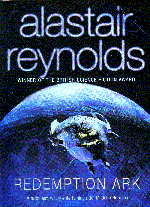|
Redemption Ark
Copyright 2002 by
I first read this on the 16th June 2003. In which Nevil Clavain goes up against the dangerous Skade, and very nearly goes up against the Inhibitors, the deadly machine intelligences that are dedicated to eliminating all life in our galaxy. It is the 27th century in the universe of "Revelation Space" and "Chasm City", The Conjoiners are slowly winning the war against the Demarchists, but winning the war no longer matters to the Conjoiners, they have discovered another, far more serious, issue. The war is irrelevant now, but they will keep it going just to keep the Demarchists from noticing the big problem until it is far too late. Meantime, on the planet Resurgam in the Delta Pavonis system, the government Inquisitor has just discovered the planet is about to be destroyed. She knows that the people will not believe anything the government tells them, so she has come up with a cunning plan to save the world. This is a big book and it is pretty good, there are some exciting and intriguing plotlines and strange worlds. There are great characters and excellent spacecraft:
I have the same complaint that I had for "Revelation Space". The book is too big and untidy. Mr. Reynolds has adopted the Hollywood action movie methodology: keep piling on the action and every time an ending looks likely incorporate another chase sequence or fight scene. I would have been happy with a shorter book, written more tightly, with less loose ends, something less Peter F Hamiltonian. He is also becoming incapable of permanently removing any major characters. I would have been happy with a few more dead, permanently dead protagonists. Sure he may have eliminated 40,000 people in a stroke of the pen near the end of the novel, but that does not matter a jot if you haven't met any of them. Any man's death diminishes me, of course, but blow away half a dozen or so characters that I'd got to know and I would liked the book more and probably praised its gritty realism. Some more significant deaths would have provided a little bittersweet satisfaction, and would have helped to keep complexity down to a reasonable level in the inevitable sequel. Yes, I know a couple of major characters are meant to have died, but I don't believe it for a moment. Either they'll somehow have survived, or they'll have clones somewhere, or an "alpha-level" computer emulation of them will surface on a computer system, or it will all turn out to have been some kind of weird dream. Furthermore, these cache weapons were surprisingly low-powered. I was anticipating something that would blow a corner off of Andromeda, or freeze a sun at least. After several hundred pages I certainly did not expect something as trivial as ripping a hole in a spaceship. I can see now why the weapons had been hidden away for so long: their engineers were simply too embarrassed to show them off publicly (which reminds me to reread Philip K. Dicks' excellent "The Zap Gun" sometime soon). In conclusion, the novel is worth reading. It is frequently exciting. There are piles of great ideas, but it is nowhere near as good as it could have been. Loaded on the 1st August 2003.
|
|






